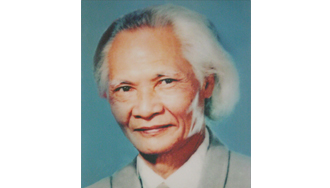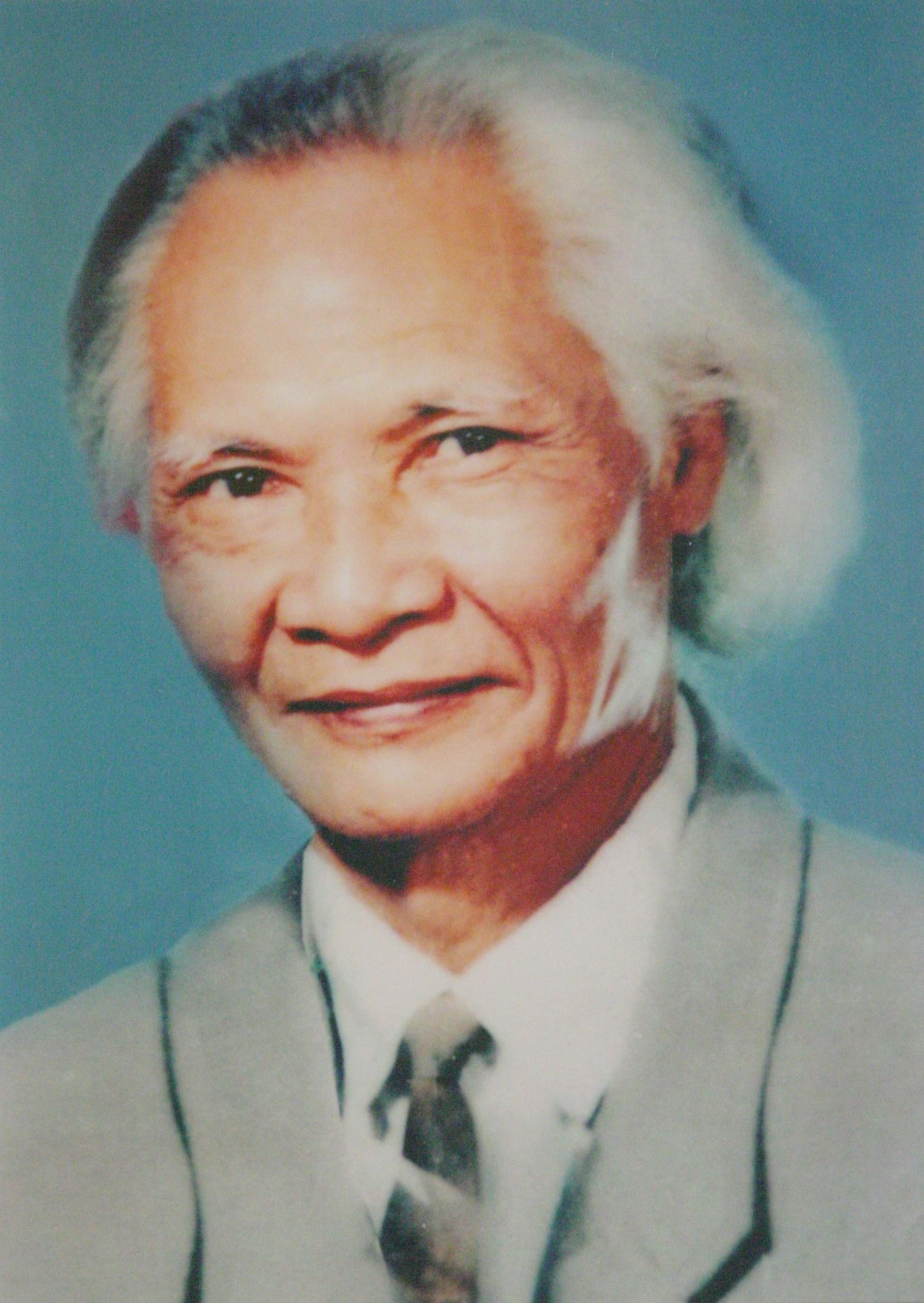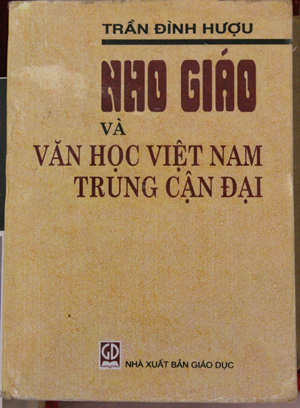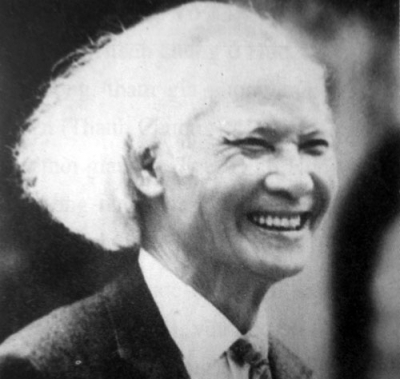
Researcher Lai Nguyen An, who was instrumental in publishing the book, was a student of the 9th class of the Faculty of Literature, Hanoi University of Science. He recounted: Among the many topics he studied in his fourth year (1967), he was most interested in the topic of Confucianism and Lao-Zhuang thought presented by Mr. Huou. With a serious learning style, he took shorthand notes of this lecture of his teacher in 130 pages of a notebook measuring 13 x 19 cm. As time passed, by the 1980s, he gradually became aware of the new academic ideas of Mr. Huou, such as the assertion that it was impossible to consider the entire medieval Vietnamese literature from a theoretical perspective of realism, or the assertion that Vietnamese literature in the first thirty years of the 20th century was a process of transforming the literary system, from the medieval and modern literary system to the modern literary system, from the genre system of poetry and prose to the genre system of new poetry, drama, novels, criticism, etc. He began to actively participate in academic activities where Mr. Huou gave presentations. After his death, he realized that there were many things he should have asked Mr. Huou but had not had the opportunity. And he suddenly remembered the notebook recording his lecture in the winter of 1967 in a remote lecture hall in the evacuation area in Dai Tu, Thai Nguyen. In the 1990s, some books also appeared from students' notebooks, such asChinese social history(Social Sciences Publishing House, 1994)-Lecture by Professor Dang Thai Mai for the Sinology class 1965-1968, bookHistory of Thought Before Mars(Social Sciences Publishing House, 1995) lectures by Professor Tran Duc Thao in 1956-57. The way he made those books encouraged him to work on Tran Dinh Huou's lecture notes more than twenty years ago. He found all six cassette tapes recording lectures on Confucianism and Confucianism in Vietnam at the Institute of Culture and Arts, 1991, combined with the notes of critic Nguyen Hoa - who directly listened to the lectures that year. And so the work was born.

Associate Professor Tran Dinh Huou (1926-1995)
The influence of teachers on academic ideology on students is expressed in many different forms. But the influence of teacher Tran Dinh Huou on students Lai Nguyen An and Nguyen Hoa has a rather rare form: the teacher's academic ideology and viewpoints, over time, are increasingly perceived more deeply. After decades, his lectures have been painstakingly reproduced by his students into books. Such cases are not many in academia as well as in university practice in our country until today. That event recorded the influence of teacher Tran Dinh Huou on many generations of students and in a wide academic scope. Researcher Lai Nguyen An, a former student, called him teacher, and critic Nguyen Hoa, who did not formally study the teacher's subject at university but only studied the subject he taught at the Institute of Culture and Arts, also called him teacher. The combination of teacher and scientist in him is a harmonious and smooth combination.
*
Professor Tran Dinh Huou's research and teaching career was diverse, demonstrating the erudition and intelligence of a true scientist. After his death, the Education Publishing House printedTran Dinh Huou's selected worksconsists of 2 volumes, each volume has nearly a thousand pages printed in size 16x24 cm. Volume 1 is for studies on philosophy and history of ideas, volume 2 is for studies on literature.
His scientific career started with the study of the history of Eastern philosophical thought, then from the perspective of Eastern philosophy he read Vietnamese literature in the Middle Ages and Modern Times. In the field of research on the history of thought and philosophy as well as literature, he made important contributions. There have been many theses and articles researching his scientific legacy and there is still a need for further in-depth research, pointing out the profound layers of scientific thought in this legacy.
What are the lessons from the career of Professor Tran Dinh Huou? We would like to talk about lessons that can be useful for the generation of lecturers and young researchers who are currently continuing their research and teaching careers at the Faculty of Literature, University of Social Sciences and Humanities.
Nowadays, we are actively absorbing many theories and research methods from the world, especially from the West, in studying and solving Vietnam's problems. The current generation of young researchers has favorable conditions to receive many theories from the West. That is very healthy. Throughout his life, Mr. Huou also received foreign theories and methods. We know that Mr. Huou was deeply influenced by the work ofWest and Eastvery famous by Academician NI Conrad. This is a comparative research work on Western and Eastern culture, philosophy and literature with a system of extremely important issues such as the Renaissance in Western and Eastern culture, the issue of whether or not there is realism in Eastern literature, the historical concept of ancient Eastern and Western historians... But Mr. Huou, although very fond of Conrad, still chose to stand firmly on the reality of Vietnam to solve Vietnam's problems, general theories from foreign practices are only for reference. We can take an example of a time of revolutionary romance, when many people called for the eradication of Confucian remnants in Vietnam with the simple idea that it was necessary to wipe out old philosophical and ethical thoughts as a way to pave the way for socialist ideology to triumph.
Tran Dinh Huou believes that this is a childish way of thinking, not reflecting the reality of Vietnam: “Confucianism was born and existed in association with an economic - political - social mechanism, the concentrated expression of which is the Oriental autocratic state. That mechanism chose Confucianism, on the one hand, it outlined the path of development, on the other hand, it created a life. Being conditioned in it, people were not only forced to adapt but also chose Confucianism, living as specific human models: kings, mandarins, officials, rich people, powerful people, gentry, Confucian scholars, petty farmers... When that mechanism and social environment have not fundamentally changed, people still automatically adapt to it, live according to the old human models, still think, still live in a Confucianized way. There are people who consider themselves to have shaken off the influence of Confucianism, strongly condemn Confucianism, but still live and still think very “Confucian”. But in such a reality, Confucianism not only remains, but new thoughts from the outside are also Confucianized; in a certain place Therefore, Confucianism is considered to be wiped out, but it still has the ability to regenerate. In both the study of the history of thought and the study of medieval and modern literature, Tran Dinh Huou stood firmly on the national reality, "looking at reality in a historical, complete, and clear way", researching and analyzing that reality to propose scientific methods of response. Although in the historical past of Vietnam in particular and East Asian countries in general, Confucianism (as a philosophical or religious doctrine, an ethical doctrine or a political-social ideology) was not the only one, but clearly, it was the doctrine that played the most important role, in the position of the most long-lasting and enduring orthodox ideology, contributing mainly to the identity of the culture of the whole region, so not understanding it correctly and deeply also means not being able to understand correctly and deeply the nature of existence in an overall view of the entire historical past.
Therefore, his works on the history of ideas are alsoimbued with the spirit of practical service.

Cover of the book "Confucianism and Vietnamese Literature in the Middle Ages and Modern Times" by Associate Professor Tran Dinh Huou - a scientific work awarded the State Prize for Science and Technology in 2000.
In literary research, Tran Dinh Huou also stands firmly on the ground of Vietnamese literary practice. While many colleagues choose the theory of class struggle to analyze the system of literary characters, choose the theory of realism to evaluate literary works, choose the social form according to the production method diagram to explain the transformation process of Vietnamese literature from feudal times to modern times, etc., Tran Dinh Huou honestly describes the reality of Vietnamese social culture.
Tran Dinh Huou was primarily interested in the types of people in Confucian society: kings, mandarins, officials, nobles, strongmen, gentry, scholars, petty farmers, etc. To analyze these types of characters, he often classified them according to criteria. This is a new point, his contribution compared to other Vietnamese authors in the way of reading the culture of Confucian society. From a political perspective, the diversity of human models is classified by him into two types of characters: emperors and subjects. All are subjects, the emperor's throne is sacred. This perspective emphasizes the autocratic nature of the social model and helps decode many phenomena of medieval Vietnamese cultural ideology. To see the richness and complexity of the Confucian model in reality, and the influence of Confucian models on literature, he distinguished three types: practicing religion, hermits, and amateurs. This approach avoids the rigid and simplistic view compared to the classification of people according to class criteria.

Associate Professor Tran Dinh Huou is a leading expert on the history of Eastern philosophy, history of thought, and history of Vietnamese literature and culture.
The meaning of the concept of “truth” in medieval literature is still misunderstood by many people as realistic, realistic. Tran Dinh Huou has painstakingly deconstructed the meaning of those concepts of truth and reality: “When comparing words and ideas, literature and heart, the truth that they talk about is the honesty with the heart, not with the scene”. Simply put, the truth and reality that Confucian scholars talk about is the honesty of moral personality. If one wants to express a people-oriented ideology, the author himself must have true love for the people, if one wants to talk about noble personality, the poet himself must have personality. Regarding the image of society in medieval literature, he wrote “Society is no longer life but human relations, order, human relationships and the world. People are only models of morality according to common morality… Reality is forced to lose its vitality and becomes models, symbolic objects to talk about the Way”.
Regarding the process of literary modernization, Tran Dinh Huou believes that it is the process of transformation of the literary system from the medieval to the modern literary system, from prose and poetry to poetry, drama, and novels in a new style influenced by the West.
Looking back at his career, not all problems have been thoroughly solved, not all the theses he raised have been completed, but the important lesson is to research for practice, to stick to practice to research. The cultural and literary practice of the nation is rich and diverse, and no available foreign theory is perfect to apply.
Another lesson that we think is also very important for today's young generation is the steadfastness of an academic spirit of Mr. Tran Dinh Huou. Temporarily during a period from 1960-1970, Mr. Huou suffered a certain disadvantage because his new and unique academic ideas were not widely shared and understood by the research community. But he still worked silently, not changing the path he had chosen. In the end, science won. During his lifetime, Mr. Bui Duy Tan once said: there were works of Mr. Huou that when he was alive, not a single word was printed, but when he passed away, people published every word. The academic viewpoint of Mr. Tran Dinh Huou was finally widely accepted by society. Not only did former students transcribe his lectures into books, not only did the collection of nearly 2,000 pages of his work published, the Ministry of Education included it in the reform book.Literature 12an excerpt from the bookFrom tradition to modernityTitleLooking at national cultural capital.From high school students to university students and researchers, Mr. Huou's research ideas have been spreading. That is the pride of us, his students, of us, his future colleagues.
June 2015
|
ASSOCIATE PROFESSOR, MERITORIAL TEACHER TRAN DINH HUU
+ Working unit: Faculty of Literature, Hanoi University of Science.
Vietnamese Literature in the Transitional Period 1900 - 1930(editor). University and Vocational Education Publishing House, 1988. Literature and reality(co-authored). Social Sciences Publishing House, 1990. From tradition to modernity. 1994. Confucianism and Vietnamese literature in the Middle Ages and Modern Times. Culture and Information Publishing House, 1995. Lectures on Eastern Thought(Written by Lai Nguyen An). Hanoi National University Publishing House, 2001. Tran Dinh Huou Collection(2 volumes) (Education Publishing House 2007).
+ State Prize for Science and Technology in 2000 for the cluster of works:From tradition to the present; Confucianism and medieval and modern Vietnamese literature. |
Author:Associate Professor, Dr. Tran Nho Thin; Professor, Dr. Tran Ngoc Vuong
Newer news
Older news